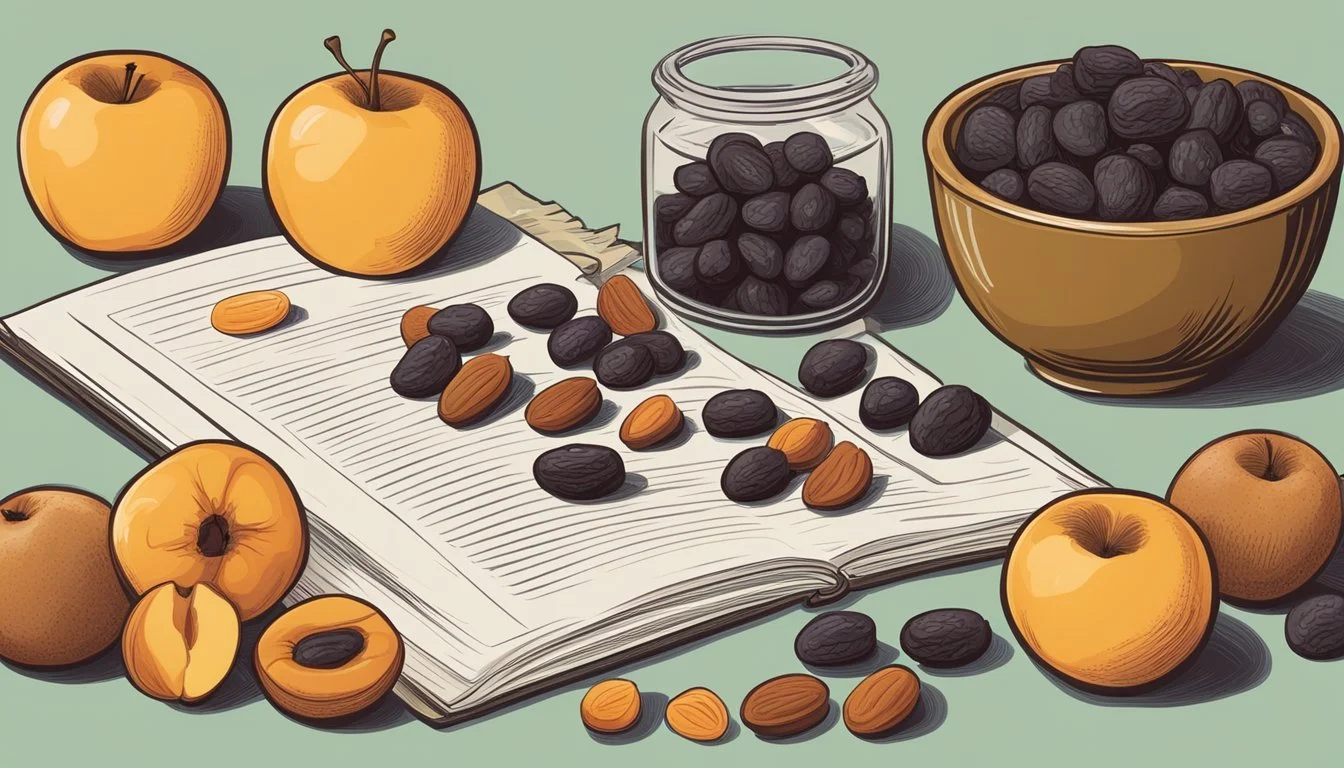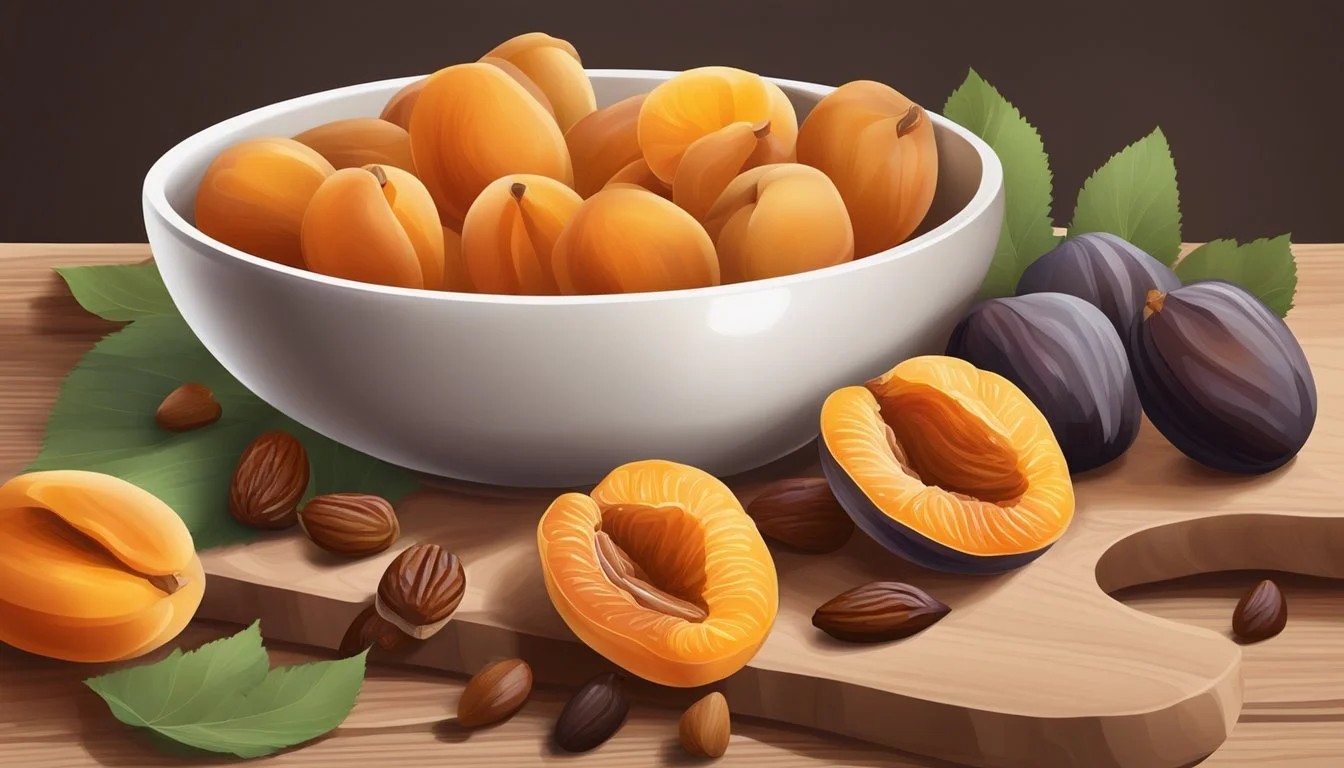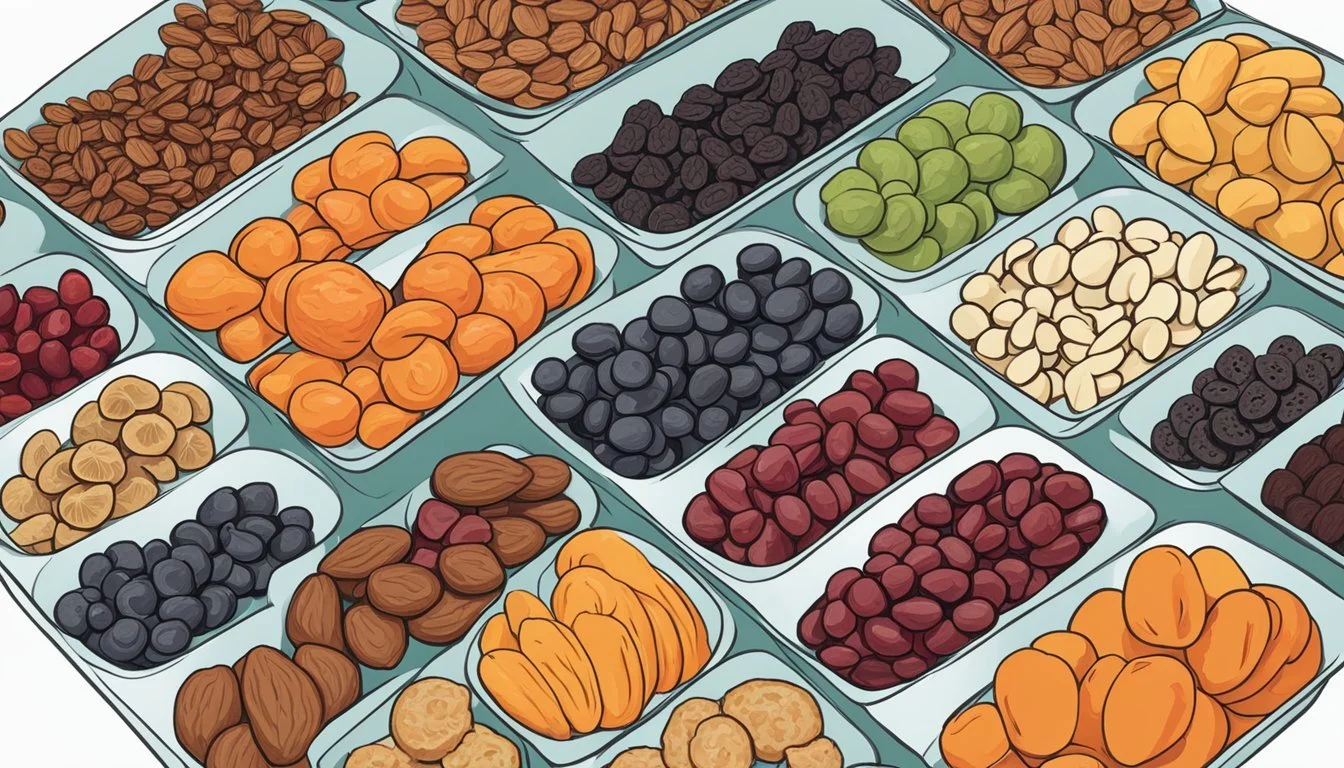Raisins Substitutes
Best Alternatives for Every Recipe
Raisins are a beloved ingredient in many recipes, but sometimes you might need or want a substitute. Whether you're out of raisins or simply looking to mix things up, there are several delicious and nutritious alternatives to consider. These options not only mimic raisins in texture but also bring their unique flavors and health benefits to your dishes.
Dried currants, dried cranberries, prunes, dates, dried cherries, dried apricots, and dried pineapple can all serve as excellent replacements in both baking and cooking. Each of these substitutes can be finely minced to match the size and chewiness of raisins, ensuring they blend seamlessly into your favorite recipes. From adding sweetness to cookies and cakes to enriching savory dishes, these alternatives are versatile and easy to use.
Moreover, many of these substitutes come packed with nutrients that can enhance the health benefits of your meals. For example, prunes are rich in fiber and potassium, while dates provide a boost of essential vitamins and minerals. By experimenting with these varied fruits, you can discover new flavors and textures that elevate your culinary creations.
Understanding Raisins in Recipes
Raisins, recognized for their natural sweetness and chewy texture, play a multifaceted role in both baking and cooking. They contribute valuable nutrients, and enhance flavors, and textures, while also offering a dose of natural sugars.
Role of Raisins in Baking and Cooking
Raisins are often utilized for their sweetness and chewy consistency. In baked goods like cookies and breads, they offer bursts of natural sugar, enhancing taste profiles without the need for added sweeteners. They help retain moisture in recipes such as cakes and muffins, ensuring a moist and tender crumb.
In savory dishes, raisins provide a counterbalance to salty or spicy ingredients. This makes them a vital component in recipes like stews, pilafs, and salads. When simmered, they can absorb surrounding flavors, adding a depth that other dried fruits may lack.
Nutritional Profiles and Benefits
Raisins are packed with essential vitamins and minerals. They are a good source of fiber, which supports digestive health, and contain significant amounts of potassium, aiding in heart health. Raisins also boast a high level of antioxidants, which are known to combat oxidative stress.
The natural sugars in raisins provide quick energy, making them a healthy snack choice. They also contain iron, which is vital for healthy blood cell production, and small amounts of calcium, contributing to bone health. Their nutrient density makes them an ideal ingredient for adding nutritional value to various recipes.
Taste and Texture Contributions
Raisins bring a unique blend of sweetness and a distinct chewy texture to recipes. Their flavor profile is often described as fruity with notes of caramel due to the natural sugars concentrated during the drying process. When used in baking, this sweetness can enhance the overall taste without overpowering other ingredients.
Their chewy texture contrasts with the crunchiness of nuts or the softness of baked goods, providing a satisfying bite. This chewy consistency also makes them ideal for snacking when combined with other dried fruits or nuts.
When cooked into dishes, raisins soften further, creating a melt-in-the-mouth texture that pairs well with both savory and sweet components, enriching the flavor and tactile experience of various culinary creations.
Common Raisin Substitutes
Replacing raisins in various recipes can be a rewarding culinary endeavor, offering new and delightful tastes and textures. Various dried fruits, nuts, seeds, and even sweeteners can serve as excellent substitutes.
Dried Fruit Alternatives
Dried cranberries are a popular substitute, bringing a sweet-tart flavor that works well in both baking and salads. Dates offer a rich, caramel-like sweetness. Dried cherries add a tart and slightly sweet note. Currants are similar in size to raisins and provide a tangy burst of flavor.
Prunes, which are dried plums, are sweet and slightly tart, making them an excellent option. Figs deliver a sweet and earthy taste, often enhancing baked goods. Dried apricots can be used, lending a slightly tangy and sweet flavor.
Utilizing Nuts and Seeds
Adding chopped nuts can introduce a crunchy texture and nutty flavor. Almonds, walnuts, and pecans are excellent choices. Nuts not only replace the texture of raisins but also add additional protein and healthy fats to your dish.
Seeds like pumpkin seeds or sunflower seeds can also offer a unique texture. They are particularly good in granola or yogurt. Both nuts and seeds can be easily chopped and mixed into various recipes.
Innovative Sweeteners and Chocolates
Chocolate chips can be used as a substitute in cookies and muffins, providing a sweet and indulgent twist. For a healthier option, consider adding goji berries, known for their high levels of antioxidants and vitamins.
Honey or maple syrup can serve as natural sweeteners in recipes, offering a different kind of sweetness that can enhance the flavor profile. Yogurt-covered raisins can add a creamy texture along with sweetness, especially useful in snacks and desserts.
Adapting Substitutes to Specific Dishes
Adapting substitutes for raisins to different dishes can enhance flavors and offer diverse nutritional benefits. Understanding the right alternatives for various culinary applications is essential for achieving desired taste and texture.
Baked Goods and Desserts
In baked goods like muffins, cookies, and banana bread, dates can be an excellent substitute. They offer a sweet flavor and caramel-like texture, making them a great fit for baking recipes.
For carrot cake and scones, dried figs bring a rich, earthy sweetness that complements these desserts beautifully. Use minced prunes for pie fillings and puddings, as they provide a sweet and slightly tart flavor that can elevate these dishes.
When adapting recipes, replacing raisins with these alternatives can maintain the intended sweetness and add unique textures.
Breakfast Dishes and Granolas
For oatmeal and granola bars, fresh cranberries add a splash of tartness that contrasts well with the other sweet ingredients. They’re also packed with vitamin C, enhancing the nutritional profile.
In pancakes and breakfast dishes, pitted dates or minced prunes can be used to add a natural sweetness without overpowering the dish. Adding dried apricots to granolas can introduce a slightly tangy note and chewiness.
Choosing the right substitute can create a more varied and interesting flavor experience, perfect for starting the day off right.
Savory Cooking Applications
In savory dishes like stews and salads, prunes and figs can replace raisins to add depth and a hint of natural sweetness. Chopped dates work well in stuffings for poultry, offering a balance of sweetness and texture.
For savory preparations, considering the balance of flavors is crucial. Prunes add moisture to lean meats, while figs complement dishes with spicy or tangy components.
These alternatives not only fit well into various savory recipes but also contribute additional nutrients like fiber and minerals.
Creative Cooking with Fruit Substitutes
Exploring different fruit substitutes can add new flavors and textures to dishes. This section discusses using dried fruits for sweetness, adding a balance of tart and sweet flavors, and experimenting with fruit varieties to enhance the overall flavor profile.
Sweetening with Dried Fruit
Pitted and minced dates offer a sweet taste similar to raisins but with a richer flavor and higher sugar content. They can be used in baking, such as cookies and cakes, to add natural sweetness. Prunes also serve as an excellent raisin substitute. They provide fiber, vitamins, and minerals, making them suitable for both sweet and savory dishes like stews.
Dried pineapple is another great option. With its sweet and slightly tart profile, it can be added to granola, muffins, or salads. Dried apples offer a comparable sweetness and texture to raisins, and they are versatile in many culinary applications from snacks to baked goods.
Livening up Meals with Tartness and Sweetness
Adding sweet-tart fruits can liven up various dishes. Dried cranberries, known for their sweet-tart flavor, can be used in salads, poultry stuffing, and desserts. This combination of flavors adds depth to recipes. Similarly, dried cherries provide a natural sweetness with a hint of tartness that pairs well with both sweet and savory dishes.
Fresh blueberries and raspberries can also be used. These berries add a burst of freshness and slight tartness, making them ideal for breakfast dishes, smoothies, and salads. Their vibrant colors and flavors enhance the visual and taste appeal of any meal.
Enhancing Flavor with Fruit Variety
Using a variety of fruits can enhance the flavor of dishes. Mango and pineapple can be excellent substitutes for raisins in tropical-themed recipes, adding a unique sweetness and tang. These fruits are versatile and can be used in chutneys, salsas, or desserts.
Dried figs bring an earthy sweetness that complements both sweet and savory recipes. They can be added to pastries, oatmeal, or even savory dishes like grilled meats. Each fruit brings its unique flavor profile, offering endless opportunities for culinary creativity.
Using these fruit substitutes can enrich dishes with diverse textures and flavors, making them stand out. Experimenting with different fruits allows for personalized and innovative cooking experiences.
Considerations for Dietary Restrictions
When selecting a raisin substitute, it's crucial to consider dietary restrictions, including allergies and the need for low-sugar or low-carb alternatives. Different substitutes can cater to various dietary needs, ensuring that everyone can enjoy their favorite recipes without compromising their health.
Allergy-Friendly Options
Individuals with allergies, especially nut allergies or gluten intolerance, need to be cautious with substitute ingredients. Dried apples and dried pears are excellent alternatives. They provide similar texture and sweetness as raisins without common allergens.
Dates are another safe option, particularly for those allergic to nuts, but they should be introduced in moderation due to their high sugar content. Dried cranberries can also be used, though they often contain added sugars. Always check labels for potential allergens.
Low-Sugar and Low-Carb Alternatives
For those needing low-sugar or low-carb options, several substitutes work well. Dried apricots have a lower glycemic index than raisins, making them suitable for diabetics. They offer a sweet yet less sugary flavor.
Golden berries provide a tangy and less sweet alternative, ideal for reducing sugar intake. Unsweetened coconut flakes can also serve as a low-carb choice with a different but complementary texture.
For a precise comparison, consider the sugar content per serving:
Substitute Sugar Content (per 30g) Dried Apples 13g Dates 24g Dried Apricots 8g Golden Berries 6g Unsweetened Coconut 1g
These options allow individuals to enjoy their meals while maintaining their dietary restrictions.
Preservation and Storage Tips
Proper preservation and storage of raisin substitutes are crucial to maintain their quality, longevity, and flavor. The following methods will help maximize shelf life and ensure the substitutes retain their optimal texture and taste.
Maximizing Shelf Life for Substitutes
To extend the shelf life of raisin substitutes, consider storing them in airtight containers. Glass jars with tight-fitting lids or re-sealable plastic bags such as Ziplock or Mylar bags are ideal. Removing as much air as possible before sealing helps minimize oxygen exposure, reducing the risk of spoilage.
For best results, store substitutes in a cool, dark area where the temperature remains below 70°F (21°C). Avoid placing them near heat-generating appliances. Humidity should also be kept low, ideally below 50%, to prevent moisture accumulation which can lead to mold growth.
Maintaining Optimal Texture and Flavor
To keep the texture and flavor of raisin substitutes at their best, consider the moisture content. If substitutes become hard, soaking them in hot water for 10-15 minutes can rehydrate and soften them. After soaking, ensure they are thoroughly dried using a clean towel before storage.
Another option is to use oxygen absorbers when packaging dried fruits. This helps remove any residual oxygen inside the storage container, protecting the substitutes from rancidity and fungi. If storing for longer periods, some pre-treating by further drying can be beneficial to ensure the quality is maintained over time.
Pairing Substitutes with Complementary Flavors
Pairing raisin substitutes with complementary flavors enhances the taste and texture of your dishes. Utilize spices, tangy fruits, nuts, and seeds to create richer and more diverse culinary experiences.
Matching Substitutes with Spices and Herbs
Use cinnamon to enhance the sweetness of minced dried apricots or figs. These substitutions work well in baked goods like muffins or granola bars.
Dates, when paired with nutmeg or cloves, provide a rich depth to pastries and holiday-themed recipes.
Try adding vanilla and ginger to dried cranberries for a zesty and heartwarming flavor combination, perfect for spiced cakes or cookies.
Balancing Sweetness with Tangy Fruits
Combine prunes with dried cranberries to add a tart contrast in pies and crumbles. The sweetness of prunes balances well with the tanginess of cranberries.
Pitted and minced dates paired with small pieces of dried pineapple can add a unique tropical twist to oatmeal or yogurt.
Mix figs with dried apricots to bring a combination of sweet and tangy elements to glazes for meats or fillings for pastries.
Nut and Seed Combinations for Texture
Walnuts or pecans can be mixed with any raisin substitute, such as dried cherries or minced dates, to introduce a satisfying crunch to baked desserts or salads.
Chopped almonds work well with dried figs to enhance both the texture and nutty flavor in granola or energy bars.
Consider using sunflower seeds with minced dried apricots to add a delicate crunch and a hint of earthiness, making it ideal for breakfast bowls or trail mixes.







